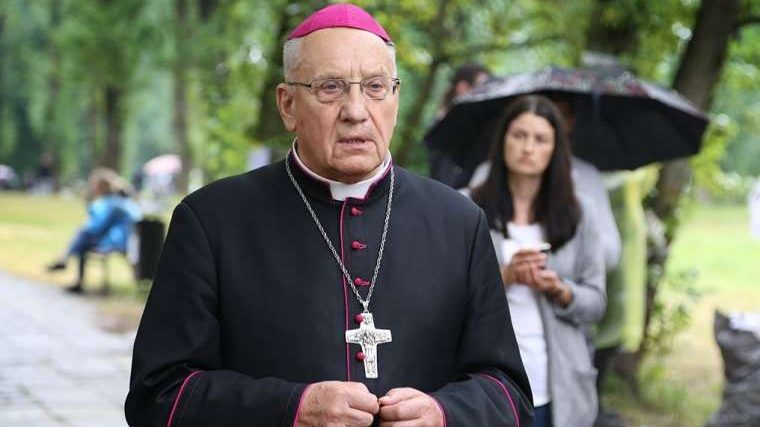Less than two weeks after Archbishop Tadeusz Kondrusiewicz of Minsk was allowed to return to Belarus after a four-month exile, the Vatican announced Sunday that Pope Francis had accepted the archbishop’s resignation on his 75th birthday.
In a statement Jan. 3, the Holy See Press Office said that the pope had accepted the archbishop’s resignation in accordance with the Church canon that requests that a bishop offers his resignation to the pope at the age of 75.
The Vatican did not name a successor metropolitan archbishop of Minsk-Mohilev, but appointed 75-year-old Bishop Kazimierz Wielikosielec, the current auxiliary bishop of Pinsk, to serve as apostolic administrator of the archdiocese.
In Belarus, Catholics celebrated Kondrusiewicz’s 75th birthday on Jan. 3 by creating a video honoring his life of service to the Church and holding signs of congratulations.
Kondrusiewicz returned to Belarus on Dec. 24, nearly four months after he was barred from entering his native country after he had spoken in defense of protesters following a disputed presidential election.
Belarusian authorities permitted his return to the country to celebrate Christmas at the request of Pope Francis, according to the nunciature in Belarus.
“The challenges of the coronavirus pandemic and the socio-political crisis call us to return to true religiosity, which shows that we are created for something more than just caring for earthly affairs and pleasures,” Archbishop Kondrusiewicz said Dec. 24.
“The doors of the former Soviet Union, where militant atheism has prevailed for three generations, have opened to Christ. We got freedom, including religion. Unfortunately, we soon forgot that freedom is not only a gift, but also a responsibility,” he said in his homily, according to the website of the Catholic Church in Belarus.
Protests in Belarus began Aug. 9 after president Alexander Lukashenko was declared to have won that day's election with 80% of the vote. Electoral officials said that the opposition candidate, Sviatlana Tsikhanouskaya, earned 10% of the vote. The opposition claims that she actually garnered at least 60% of votes.
Thousands of protesters against the election results were detained, including a number of priests. Archbishop Kondrusiewicz prayed outside of a prison where protesters were being held on Aug. 20.
Later that month Kondrusiewicz, who had been visiting Poland, was blocked from returning to Belarus by Belarusian border guards. His passport had been invalidated.
Lukashenko, who has served as president of Belarus since the position was created in 1994, suggested that Kondrusiewicz might be a citizen of more than one country — a claim that the archbishop denied.
The U.S., U.K., and EU no longer recognize Lukashenko as the Belarusian president. Canada, the U.K., and the EU have placed sanctions on senior Belarusian figures.
Lukashenko secured a $1.5 billion loan from Russian president Vladimir Putin in December as Putin denounced “external pressure” on Belarus.
Relations between the Holy See and Belarus have been strained over claims the Church in Belarus is being used to exert foreign influence, as well as Archbishop Kondrusiewicz’ exile.
Archbishop Claudio Gugerotti, apostolic nuncio to the United Kingdom, acted as a special envoy of Pope Francis to Lukashenko, delivering a letter Dec. 17 with a request regarding Archbishop Kondrusiewicz.
Archbishop Kondrusiewicz said that when he was finally allowed to cross the border and return to Belarus on Dec. 24 he knelt down, prayed and kissed the ground.
Kondrusiewicz had served as metropolitan archbishop of Minsk since 2007 and as president of the Belarusian bishops’ conference since 2015.
He was consecrated as a bishop by St. John Paul II on Oct. 20, 1989 in St. Peter’s Basilica in Rome. As bishop, Kondrusiewicz founded the Grodno Higher Theological Seminary and reopened about 100 churches that had been closed during the communist persecution, according to the website of the Catholic Church in Belarus.
In his homily on Jan. 1, Archbishop Kondrusiewicz called on Catholics in Belarus to entrust the year ahead to God “so that it may be a time of successful resolution of socio-political and epidemiological crises and a time of blessing that will bring many spiritual fruits to us and our society."

